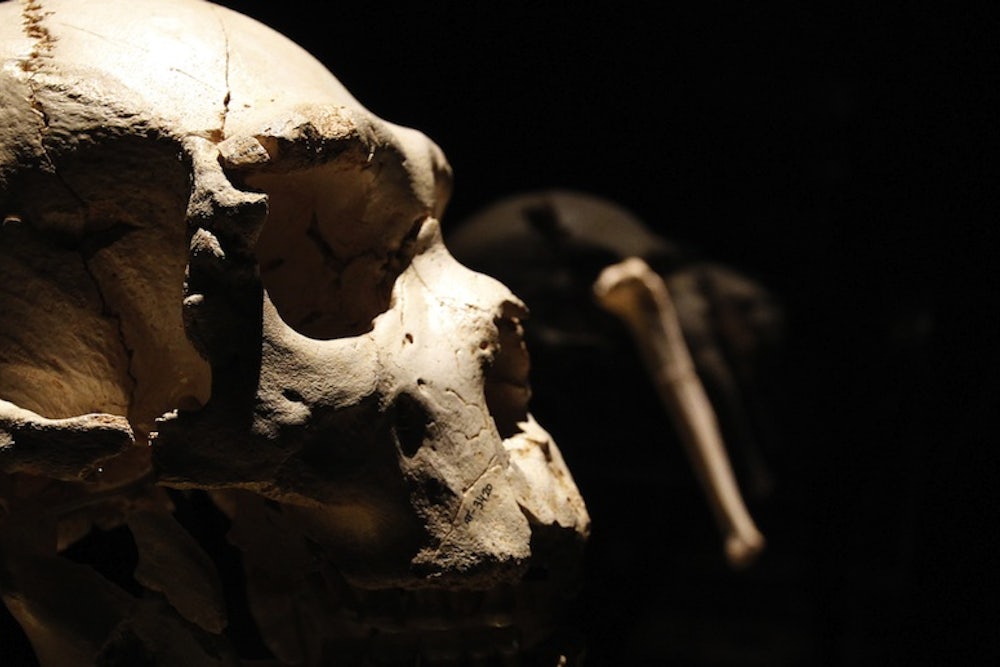Our times can lend ordinary words new shadings. It used to be that one thought of a fossil embedded in rock, but especially since the Iraq War, embed calls most immediately to mind a reporter covering military activity. In the same way, evolution these days is no longer about Darwin and finch beaks. Rather, the public figure opting to espouse a previously controversial position now tells us that their views have "evolved." It is, in truth, a weaselly business.
And a ubiquitous one. "The term 'evolving view' has been perhaps overused, but I think it is an appropriate term for me to use," Senator Lisa Murkowski said Wednesday, stopping just shy of endorsing gay marriage. What tipped the new usage would seem to have been President Obama's claim that his take on gay marriage was "evolving," after which he finally came out in favor. Since then Hillary Clinton tells us her views on gay marriage have "evolved," while Sean Hannity, not usually one for intellectual flexibility, has come out as having "evolved" on immigration.
But these evolutions seem always to be towards targets that will lend political advantage. Indeed, the word evolution is handy, in this new variation on its usage, in its connotation of progress, enlightenment. One once was lost but now one sees. One does not say, then, that one's views have simply changed, which would leave one open to the "flip-flopper" charge that so hobbled John Kerry in his attempt to elucidate his position on the War in Iraq. Unable to predict and embrace the current fashion for putting it as "evolution," Kerry was open to George W. Bush accusing him of being "for it before he was against it."
No one could get away with assailing President Obama with that kind of thing today on his position on gay marriage, because "evolution," in its Latinate air, connotes a classy intellection.
But there's more to it than that. "Evolution" carries an overtone of disconnection, as if the matter were being driven by abstract forces beyond. Natural selection, after all, is a faceless process, under which creatures transform over time as minor probablistic variations between individuals of a species lead some individuals to reproduce infinitesimally more than others, such that certain variations gradually become the default trait.
As Darwin had it, there is "grandeur in this view of life," under which "several powers" are, from some outside source (God? Chance?) "breathed into a few forms or only one," yielding "endless forms most beautiful and most wonderful." Beautiful and wonderful like, say, support for gay marriage?
Well, the evolution metaphor is innocently descriptive on the societal level, of course. Who is to say precisely how and why, for example, it would now seem barbaric in most parts of America to put out a box of cigarettes for party guests the way thoroughly civilized people did not so long ago? The health warnings hardly made any critical mass of persons quit smoking cold turkey at any given time, but society "evolved" on smoking. A web search reveals society parsed as having similarly "evolved" on not just gay but interracial marriage, and on health care, foreigners, Native American cultures, marijuana, and eugenics.
However, for all that some of late have ventured the sentiment that a corporation is a person, a society is not an individual. While a society may well, like a body of individuals comprising a species, "evolve," we assume that a Homo sapiens has a certain control over his or her opinions. To put it that one’s views have "evolved" implies, instead, a lack of agency, as if one were taken over by some outside force, "breathed into" along the lines that Mr. Darwin described.
After all, we might ask why the luminously intelligent adults in question were incapable of seeing the wisdom of the positions they have "evolved" into before. Rob Portman’s answer would be the personal experience of his son coming out changed the game. But that explanation is weaker in many of the headline cases of our moment.
It hardly renders one recreationally skeptical to question, for example, whether the pot-smoking Blue American cosmopolitan that the college-aged Barack Obama was, later the editor of the Harvard Law Review publicly embracing radical leftist law professor Derrick Bell, actually disapproved of gay people getting married. Or, who among us thinks that Hillary Clinton five years ago would have told a friend over a glass of wine that she thought gay people getting married was "unnatural"?
We are witnessing the recruitment of a noble word as a fig leaf for political opportunism. If in our current political realities that’s what it takes to drive change that betters humanity, then perhaps the most "evolved" assessment is to classify the ploy as a seedy Hegelian antithesis yielding a blessed synthesis, under which America evolves, in the true sense, towards enlightenment.
